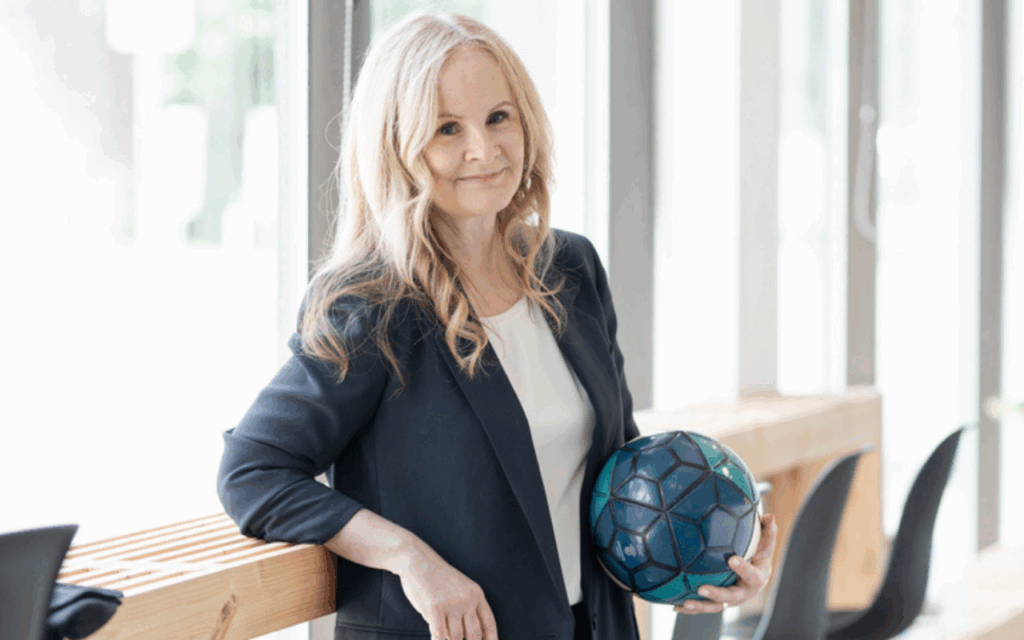
Jennifer Stewart: We’ve seen growth in women’s sports at every level across the country. Why do you think it’s finally all coming together now?
Christina Litz: Well, the truth of it is that women’s sports has been active for decades. I always say it’s taken 30 years for the WNBA to be an overnight success. We’ve had incredible players on the women’s sports side playing for many decades. Our Canadian Women’s National Team on the soccer side is no exception to that, we just weren’t able to see them other than at the Olympics or World Cup every few years.
I think the difference in the last few years is that the systems that surround the business of women’s sports have finally realized the opportunity around fandom and the business in the last four years. And what I mean by that is, for example, there’s been investment from the sponsorship side. You know, in the US with soccer, for example, there is a bank that made a very conscious decision to fund the National Women’s Soccer League and with their investment power, put pressure on the broadcasters to put that property in prime time.
Similarly, in Canada, Canadian Tire has made a very conscious decision to invest 50 per cent in men’s sports, 50 per cent in women’s sports with their sponsorship investments. And what that does is it signals to the broadcasters that there’s opportunity to bring in more ad dollars.
And so when those two systems in particular start happening and you see them invest in covering women’s sports and telling great stories and putting the games on prime time – lo and behold, there’s a fandom there. We’ve been waiting for this. It’s been pent up for a long time. The systems just needed to catch up, and I think that’s where we are today.
Catherine Clark: So you’re launching the Northern Super League, which is launching women’s soccer teams right across the country. How are you feeling right now?
Christina Litz: Well, Catherine, we are in full launch mode right now. It truly feels like a sprint—like you’re at the end of a marathon. You’ve been running all along, but now you actually need to speed up to make sure everything gets done.
The big pieces are in place – and we can talk about that – but it’s all those little details as we get closer and closer to April 16, which is kickoff in Vancouver. So yeah, we’re just at that point where there is no weekend, there’s no nine-to-five. The to-do list – you think it’s getting shorter, but there are always new things that come your way.
But I’m continually inspired by the mission of the Northern Super League and what this is all about. It’s the fuel for everything we’re doing right now.
Jennifer Stewart: Take me back, Christina, to when you decided that you wanted to pursue a career in sports – because I assume at the time, that wasn’t necessarily kind of a check in the box career path for a woman – and talk to us about what that trajectory has looked like.
Christina Litz: I don’t think I ever envisioned for myself a career in sports, and actually didn’t even make the choice, if you put it like that. And really, when I think about it and look back, you know, I’ve been in sports for about 10 years now. Before that, it was a lot of media companies, entertainment—I’m a lawyer by training, kind of came up through there.
And even though, around you—like when you’re in the media and entertainment business—you saw the power of sports and sports media, to be honest with you, it never occurred to me that I would be able to fit in and have a career there. But a recruiter found me when I was at Corus, and I was leading digital there. I had done digital transformation at a number of media companies, both on the content and fan engagement front.
So I got a call from the recruiter for the Canadian Football League. They were really looking to bring in different talents from different areas to have a different look at what the CFL was doing on the broadcast, content, digital front—which was really what my expertise at that point was. And so, with a lot of trepidation, I took the leap over there.
Those early days were intimidating, but you realize it’s a business like anything else, and when you’re invited into a business like that, there’s a reason. And so, even though I had to learn a ton, you realize those are things you can learn. The skills I brought with me were things that they needed.
It went from there. I started off in a leadership role around broadcast and digital, then eventually moved up to lead marketing and the events, and eventually strategy for the whole league. Just goes to show—you kind of have to listen to the signals the universe is sending you and be open to taking some risks.
Catherine Clark: I love the idea of taking risks, because I think for a lot of women, we tend to think, I don’t have these specific skills that are going to be necessary for this specific job. Instead, we forget that there are tons of transferable skills that we’re bringing from the various experiences we’ve had that are going to apply to the job—and also allow the company we’re going to to do better, because we’re bringing that outsider perspective.
I want to take a quick step back, because obviously you’re now in soccer, and you must love soccer to be working in it so intensely—but we understand that your own soccer career might have peaked early. Are we ever going to see you out on the pitch?
Christina Litz: Oh gosh, no that would be a completely career limiting move if I put Look, like so many girls in this country, my first connection with team sports was through soccer. I mean, it’s still the number one participation sport, and it sort of makes sense—it’s very accessible, and it’s more affordable than some of the other sports out there.
My dad was born in England, so he had this natural connection to the sport, and he was the coach of our team. I played until I was around 12 years old, and it was a ton of fun. But like so many others, I’m a good example of what happens with girls in sports in this country—and, quite frankly, around the world—which is that by the time a lot of girls hit their teens, they drop out of team sports.
One of the key parts of our mission at the Northern Super League is not only to create pathways for girls who actually have the talent (unlike me!) to play professionally in their own country, but also to support girls more broadly. We now have so much research showing the importance of team sports for girls when it comes to leadership opportunities. There’s a stat out there that says something like 90% of female leaders played sports during high school.
There are a lot of us—other pro leagues, Canadian Women & Sport, and more—who see this moment in women’s sports as an opportunity to help girls stay in the game longer. A big part of that is simply having role models, feeling like you’re valued, and seeing that there’s a place for you to go. Just having the vision and visibility of these leagues can help make that happen.
Jennifer Stewart: Christina, how do we actually get into the school systems to help little girls who are trying sports but potentially not succeeding, and encourage them to keep working on that aspect of their lives? I reflect back on a conversation we had with Perdita, who had a terrible race in grade eight and didn’t start her sport again until later in high school because she was so emotionally upset by the impact of that defeat.
How do we nip that in the bud and keep these girls going? How do we show them the momentum and what sport can mean to them—whether it’s as an athlete, or, as you mentioned, as a leader, drawing from that experience to build strength in other areas of their lives?
Christina Litz: Such a great question! And I think the answer is really complicated. It takes many stakeholders and participants in the system. I think we’re a big part of that. Again, you know the whole “if you can see it, you can be it” idea – having role models out there who are telling their own stories about adversity and what they went through. I guarantee you, every single woman who has played pro sports has faced adversity.
It also takes one or two key people – coaches, teachers – at that very personal level, to encourage and guide. Families play a role in providing opportunities and serving as role models, and it takes community and corporate support to break down barriers for girls, especially in terms of affordability. There’s still a significant challenge in that part of the country.
But I think one of the things that’s so special about our league is that our teams are going to be in communities across Canada. They fully intend to interact with schools and community soccer clubs. Imagine if you had professional women’s soccer players show up at your school to speak and lead training sessions. For example, AFC Toronto held an open practice during March break and invited kids to come out and play – and they had lineups out the door. Just those opportunities to get up close and see your future heroes in action are so inspiring.
So, the long and short answer to my very long answer is – it takes commitment from all sorts of people in the ecosystem.
Catherine Clark: You talked a little bit about the adversity that the players have faced themselves, even just to get to the level of play that they’re at right now. Can you talk to us about some of the adversity and the challenges that you have faced along the way, too, as you’ve tried to build up this business, both both personally, but also professionally. Because I have to imagine, it’s been a bit of a slog at times.
Christina Litz: Yeah, personally, I think I’ve been lucky and privileged. That’s not to say I haven’t worked hard to get where I am, but I have to acknowledge that I’ve had a great upbringing, great parents, and great opportunities throughout my life – access to education that allowed me to earn a law degree, and then fantastic roles at great companies along the way.
I’ve definitely faced challenges in my career – on the entertainment side, the legal side, and certainly in sports. There are still outdated notions about having women in many of these industries, and there’s definitely more work to do. I would say it’s getting better in the sports business side, but we still have a long way to go in professional sports when it comes to giving women more opportunities in sports operations roles – like coaching, scouting, and training – in both men’s and women’s leagues.
For me personally, I’ve had a lot of opportunity, and that’s something we think about constantly as we build this league: How do we provide opportunity? How do we break down barriers for people from diverse backgrounds to interact with our sport and play the game? It’s a complicated challenge, but it’s something we’re deeply committed to.
On the sports side, especially when it comes to building this league, Diana Matheson – co-founder of the Northern Super League and a former national team player – has faced countless obstacles. From the very beginning, when she and her teammates envisioned a professional league in Canada, Diana took it upon herself to make it happen. When she retired and came home, she started talking to as many people as she could. At the time, Canada was one of only two countries without a domestic professional women’s league – despite performing at such a high level on the world stage. And what she found was that no one was really thinking about it. No one was seriously interested in investing. People were still saying, “Nobody watches women’s sports.”
So Diana made the decision to go all in and do it herself. Her story is incredibly inspiring and it’s what got us to where we are today. Looking forward, there will be many more challenges, but one thing I’ve learned from Diana – and from many of the athletes coming into our league – is that adversity is going to happen. It’s resilience, grit, and a commitment to your vision that gets you through. That’s something I try to keep in mind every step of the way.







